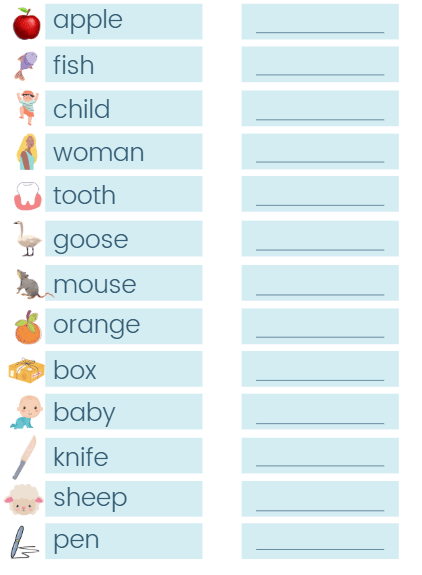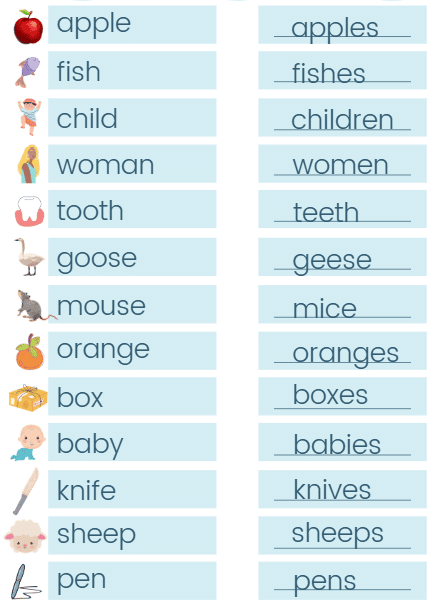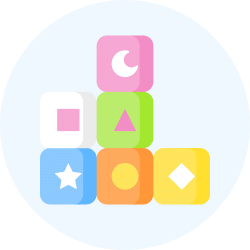LKG Exam > LKG Notes > English for LKG > Worksheet Solutions: Singular Plural - 1
Worksheet Solutions: Singular Plural - 1 | English for LKG PDF Download
Q1: Write plural forms of the nouns below
Ans:

Q2: Choose the singular nouns and plural nouns.
- cat
- bats
- big
- mean
- shoes
- door
- it
- dogs
- mat
- hat
- pens
- rugs
- on
- desk
- boot
- ball
- chairs
- floor
- over
- under
Ans:
Singular nouns
- cat
- door
- mat
- hat
- desk
- boot
- ball
- floor
Pural nouns
- bats
- shoes
- dogs
- pens
- rugs
- chairs
The document Worksheet Solutions: Singular Plural - 1 | English for LKG is a part of the LKG Course English for LKG.
All you need of LKG at this link: LKG
|
67 videos|173 docs|1 tests
|
FAQs on Worksheet Solutions: Singular Plural - 1 - English for LKG
| 1. What is the difference between singular and plural nouns? |  |
Ans.Singular nouns refer to one person, place, thing, or idea (e.g., cat, house), while plural nouns refer to more than one (e.g., cats, houses). Understanding this difference is essential for proper grammar usage.
| 2. How can I teach my child the concept of singular and plural nouns? |  |
Ans.You can teach your child by using everyday objects. Show them one item (e.g., a toy) and then show them multiple items (e.g., several toys). Use simple exercises, like asking them to count items and name them in both singular and plural forms.
| 3. Are there any rules for changing singular nouns to plural nouns? |  |
Ans.Yes, there are several rules. For most nouns, you add "s" to make them plural (e.g., dog -> dogs). For nouns ending in "s," "x," "z," "ch," or "sh," you typically add "es" (e.g., box -> boxes). Some nouns have irregular plural forms (e.g., child -> children).
| 4. Why is it important to learn singular and plural nouns in early education? |  |
Ans.Learning singular and plural nouns helps children develop their language skills. It enhances their vocabulary, improves their ability to communicate clearly, and lays the foundation for more complex grammar rules in the future.
| 5. Can you give examples of irregular plural nouns? |  |
Ans.Certain nouns do not follow standard pluralization rules. Examples include: mouse -> mice, goose -> geese, and tooth -> teeth. These exceptions are important for children to learn as they can be confusing.
Related Searches
















